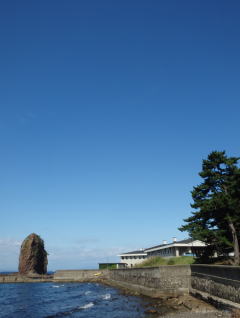Kumano lab. Developmental Biology
Asamushi Research Center for Marine Biology, Graduate School of Life
Science, Tohoku University
| Top page | Research | Members | Publications | Journal club | Contact us | Access | Links | Asamushi Research Center for Marine Biology |
Top > Asamushi Research Center for Marine Biology
 |
Asamushi Research Center for Marine Biology >>> Home Page The Asamushi Center was established as an extension facility of Biological Institute, Faculty of Science, Tohoku Imperial University in 1924 with the objective of contributing to basic biology research on marine animals and of providing marine biology courses for students. It has been located in the Asamushi hot spring resort, an area along the Mutsu bay in the northern end of the Japanese main island; this location was chosen among several other candidates as the richest place in marine lives in the Tohoku area by the founder Prof. Hatai. Being benefitted from such location, a variety of marine invertebrate species available around the Center such as those of Hydrozoa, Brachiopoda, Mollusca, Crustacea, Echinodermata, Hemichordata, and Urochordata has been used for the research and education here for many years. The center, on the other hand, has experienced several changes since its foundation including a large scale renovation of the research building, the dormitory and the boat house in 1986 through 1987 and those in the facility name with the latest one in 2011, |
||||||||||
The current research projects in the Asamushi Center are grouped mainly into two areas: developmental biology
|
|||||||||||